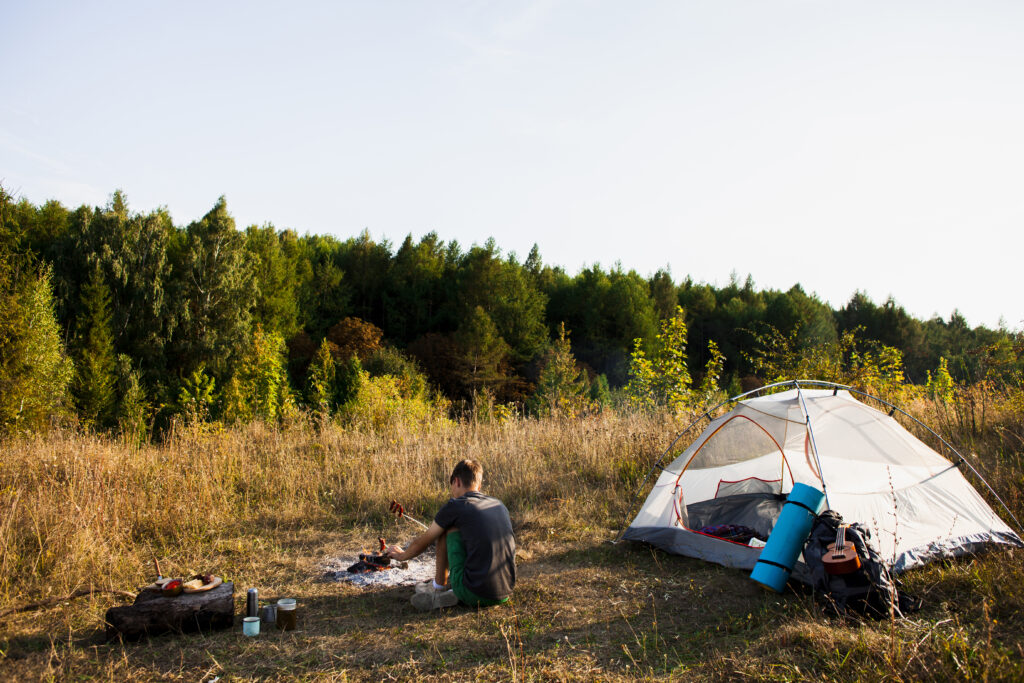When it comes to backpacking tents on sale, weight is everything. Pack too heavy a tent and you’ll be cursing the extra pounds with every uphill step.
But go too light and you may be dealing with a flimsy shelter that won’t stand up to the elements.
So what’s the sweet spot when choosing how heavy your backpacking tent should be? I’ve tested dozens of tents over hundreds of miles to find out.
The Magic Number: 2-4 Pounds Per Person
Most backpackers agree that a total tent weight of 2-4 pounds per person is the goal for a good compromise between weight and livability. This accounts for not just the tent body, but also stakes, poles, stuff sacks, etc.
For solo campers, look for tents in the 1.5-2.5 lb range. Couples should target 3-4 lbs for a roomier two-person tent. Groups of three can consider tents up to 6-7 lbs, divided by the number of occupants.
Exceeding these weights makes the tent feel like a burden. I once hauled a 5 lb two-person tent on a grueling five-day trek in Wyoming’s Wind River Range… never again!
Lightest Materials: Pros and Cons
To achieve lower weights, tent makers utilize specialty fabrics and minimalist designs. Common lightweight materials include:
- Dyneema (formerly Cuben Fiber) – Stronger than steel at 1/6 the weight. Expensive and crinkly sounding.
- Silnylon and SilPoly – Lightweight, affordable, and somewhat stretchy. Condensation can be an issue.
- No-See-Um Mesh – Offers bug protection with minimal weight. Requires a separate rain fly.
The tradeoff is that thin materials are more fragile, requiring meticulous campsite selection and use. Pole structure weight also can’t be skimped without compromising strength.
| Material | Weight (g/m^2) | Cost | Pros | Cons |
| SilNylon | 34 | $ | Affordable, durable | Stretchy, condensation |
| SilPoly | 40 | $$ | More crinkle-free | Absorbs moisture |
| Dyneema Composite | 21 | $$$ | Ultra-light, strong | Crinkles, expensive |
So while 1 lb ultra-light tents exist, I’ve had nightmares of catastrophic tent pole failure deep in the backcountry… A few carefully chosen ounces can prevent in-field disasters.
Don’t Forget About Packed Size
Weight gets all the attention, but packed size is the other key consideration. An 8 lb tent that compresses to the size of a football is far more carry-friendly than a 4 lb tent that looks like a small duffle.
Buy smart and you can get a compact tent under 3 lbs. But beware – some advertised minimum weights may not include essential components like stuff sacks and stakes. I’ve made that mistake before and regretted it with an unwieldy ‘packed’ size!

Try Before You Buy (If You Can)
Still unsure what tent weight is right for you? If possible, borrow or rent different models from friends before your next big trip.
Gear shops also sometimes allow “test drives” if you’re considering an expensive purchase. Weight, features, and ergonomics can vary dramatically, so I’ve found first-hand testing invaluable to making smart decisions. When shopping sales or online, inspect specifications carefully. With a smart, personalized choice, you can hit the trail with a backpacking tent that balances minimal weight and maximum comfort!


